Keeping bees away from your hummingbird feeders is a real conundrum for nature lovers. On the one hand, you have a beautiful, energetic creature capable of humming with its wings. If the avian world was the Wild West, hummers would be the fastest shooters in the land.
On the other hand, you have a hardworking six-legged lady who goes out selflessly for the greater good of the hive. She needs our help now more than ever.
With your heart set on rewarding hummingbirds for the show up outside the kitchen window, you want to keep the spoils for your feathered friends. Yet, you have needy and uninvited honey bees or wasps that show up every day.
What’s a hummer lover to do?
Rest assured, there ARE ways to keep bees away from hummingbird feeders.
Why Bees Are Taking Over Your Hummingbird Feeders
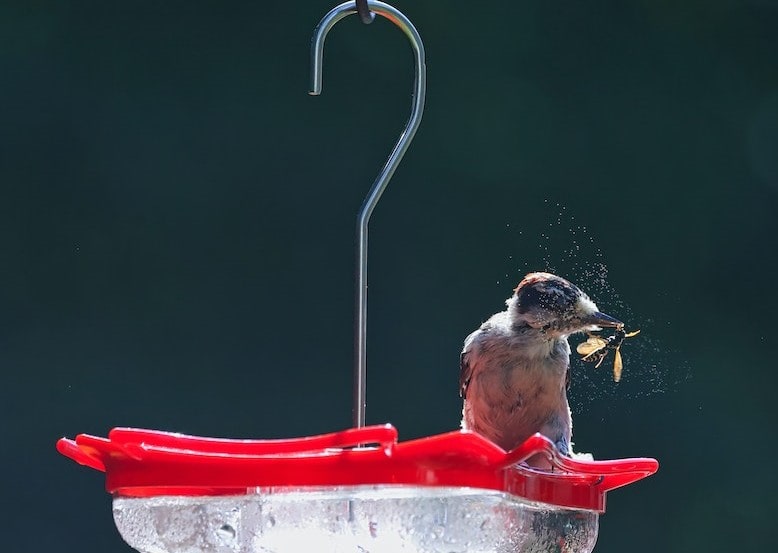
Let’s get something out of the way. Not all insects adorned in a yellow and black striped suit are bees, as they may be wasps or yellow jackets.
They get lumped together often, and it’s easy to make a mistake. You may have wasps in yellow jackets, which are very interested in the contents of your hummingbird feeder.
Wasps can get aggressive and are partly responsible for the nasty reputation bees have because they often look the same. Hence, it is important to distinguish our six-legged friends from these wasps.
This distinction is important because the rest of this article is going to be geared toward the coexistence of the two creatures rather than the elimination of one.
There are two main reasons why bees love to visit your hummingbird feeders.
1. Nectar Dearth
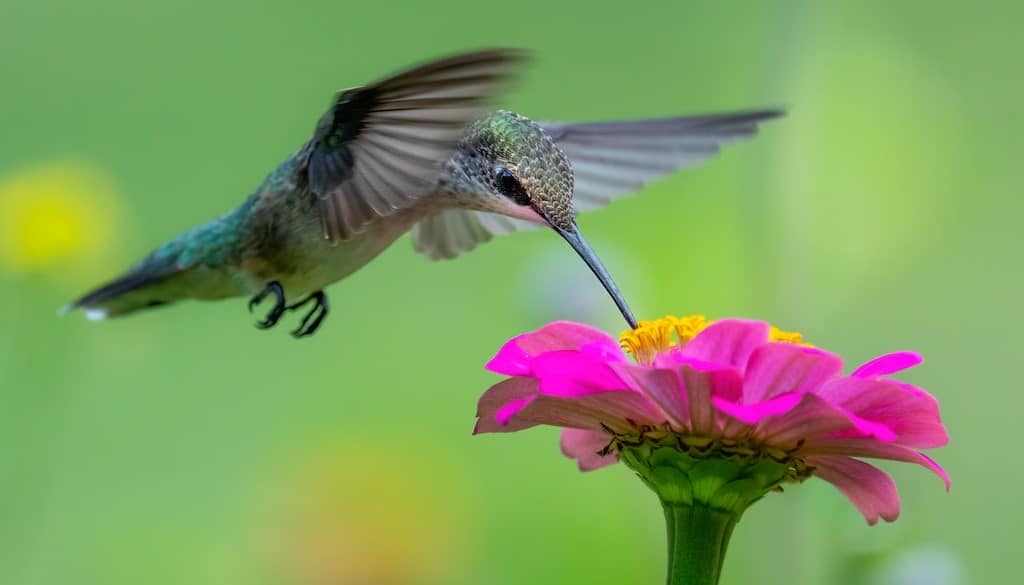
One reason your hummingbird feeders attract bees is the lack of nectar, their natural food source.
Spring comes with numerous food sources in the form of nectar-rich flowers that bees are naturally attracted to. The season brings flowering plants that truly transform the landscape, as I’m sure you’ve witnessed over the years.
However, in the heat of summer, many of these flowers, having completed their primary purpose, move on to the next phase, seed production. When that happens, there’s no nectar for bees and other sweet-loving creatures to feast on. This is known as a nectar dearth.
Now, bees do not believe in wallowing and self-pity. When the going gets tough, the tough get going. They go straight to the next best thing, in this case, your hummingbird feeder, as a bee-feeding station.
2. Your Feeder is the Closest Source of Water
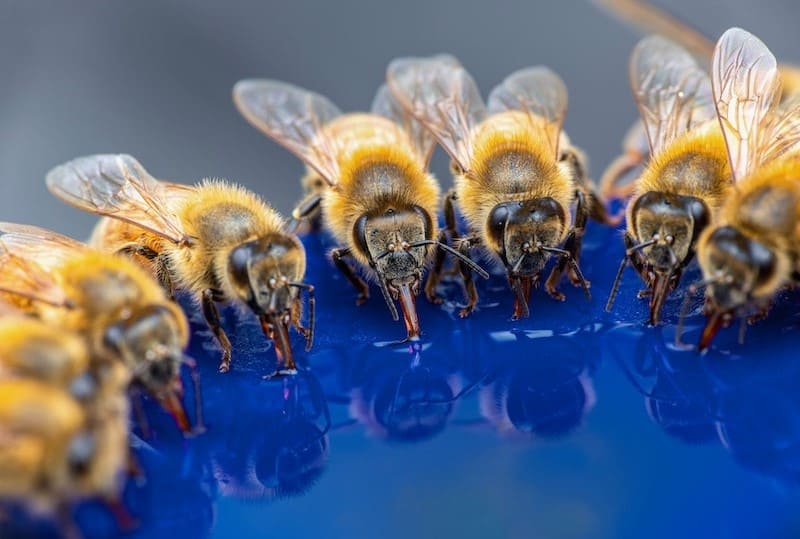
Honey bees, in particular, like very sweet substances and usually go for nectar with high sugar levels.
Beekeepers in spring may feed their colonies with syrup that mimics the sweetness of nectar.
In that case, the ratio of sugar to water is 1:1. The ratio of sugar to water for hummer sugary syrup is 1:4.
It is, therefore, a weaker solution. Yet, it is still appealing to the insects at a time of drought.
How to Keep Bees Out of Hummingbird Feeders (8 Ways)
Accessibility is key in the bee universe. As long as you can keep the bees from reaching the sweet water in the feeder, they are bound to keep away.
There are eight things you could do to help out your hummers and keep the bees away from your hummingbird feeders.
1. Choose a Saucer Type of Hummingbird Feeder Instead of One With an Inverted Design
Feeders come in two main designs, the saucer type and the inverted bottle design.
The inverted bottle nectar feeder drains slowly into the feeding chamber as the nectar within is consumed.
The problem is, on a hot day, these nectar feeders could drain faster and leak because of the increased pressure inside the bottle. Leaking attracts all sorts of critters, including bees.
On the other hand, saucer feeders
2. Keep Your Hummingbird Feeder Clean
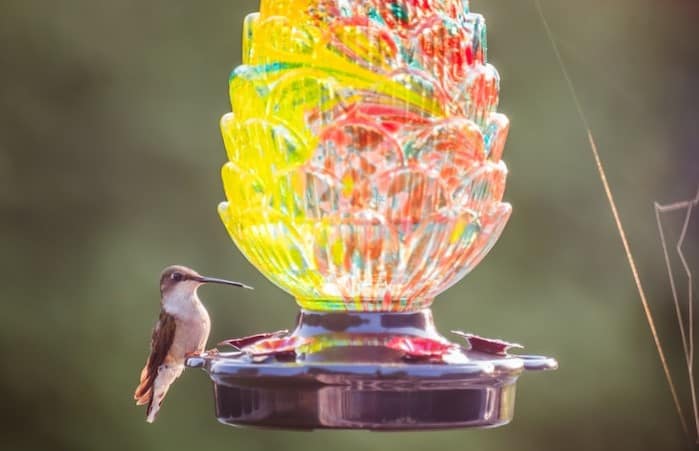
Clean up spilled nectar, repair cracks, or replace parts, and clean the whole feeder each time you refill it. The area around the feeder should also be clean, as any leak attracts bees.
Avoid having opened soda cans and used tins whose sweet contents are bound to attract bees and other insects.
3. Use Bee Guards
Hummingbirds have long beaks and tongues, which are ideally suited to reach nectar from the vault of the flowers.
Putting a mesh or
What’s more, they only call for reinforcements once they have access to the nectar. So finding a few bees investigating your hummingbird nectar feeder will not lead to a whole swarm because they won’t go and tell their sisters about their failures.
4. Stay Away From Using a Yellow Hummingbird Feeder
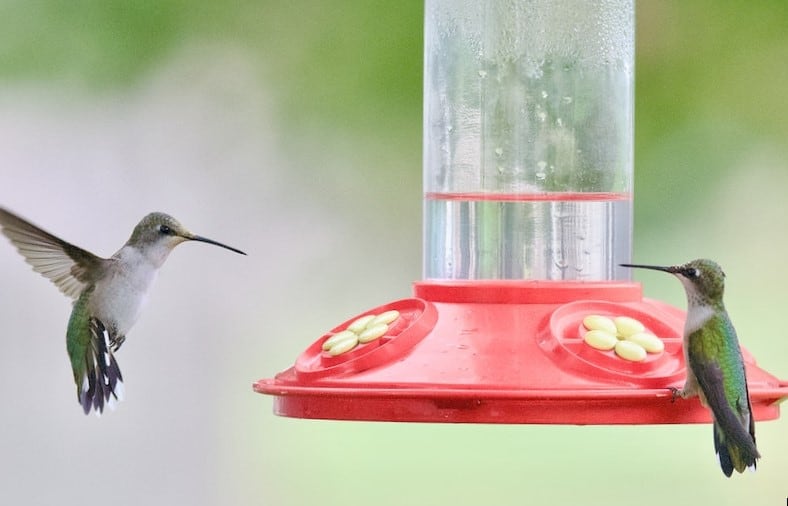
Well, this one is a minor point because lots of people with completely red hummingbird feeders have swarms of bees barricading the feeding ports, and the poor hummingbirds don’t stand a chance.
However, there are those who claim that getting a red hummingbird feeder
5. Hang the Feeder in a Shaded Area
Most of the flowers that bees prefer to grow outdoors under direct sunlight. Therefore, if your feeder also happens to be in the sun, it becomes very attractive.
In addition to that, increased exposure to sunlight can speed up the fermentation process of the nectar you placed in the feeder.
Hummingbirds don’t really need the buzz, so once your solution starts to go off, they won’t want to drink from it.
You could try putting out a bowl of water where the feeder was and putting in some gravel or marbles for the bees to stand on as they take a drink. This would help to keep your bees away from the feeder.
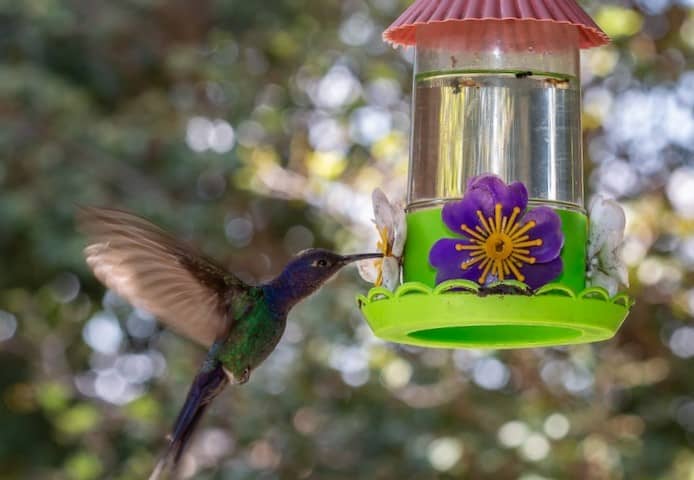
6. Move the Feeder
A little game of ‘Where’s Waldo’ with the feeder once in a while could cause the bees to move elsewhere. Moving feeders from one location to another could prevent bees from visiting the same location so often.
If the feeder is in one location one day, then the next it’s gone, they don’t waste too much time trying to find it, so they are likely to miss it just a few yards away. To confuse bees and wasps further, you could hang up a decoy feeder.
Of course, if there are no other feeding options, they might find it sooner than you think, which leads to the next point.
7. Grow a Pollinator Garden
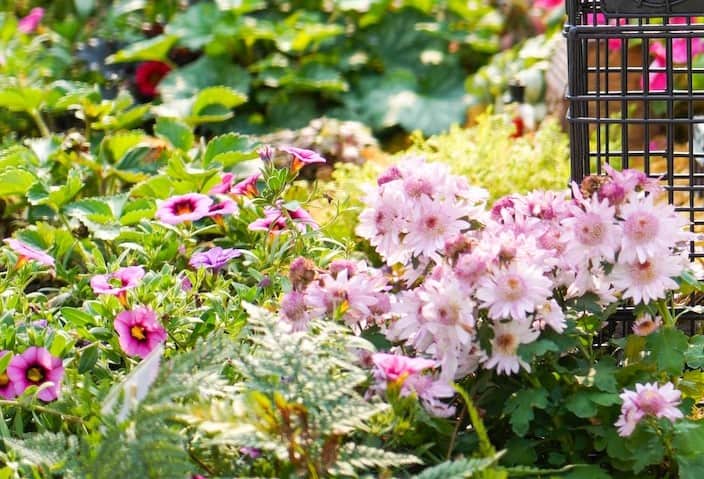
Nature would provide the best distraction. If you have an alternative floral source of nectar that the bees can’t resist, they will not bother with your hummingbird feeders.
You could also use
8. Less Sugar in the Nectar
Honey bees are quite partial to sugar, specifically sucrose.
In fact, when natural nectar sources are plenty, they will stay away from flowers whose nectar is a little weak in sugar concentration, like pear blossoms.
Therefore, if the sugar is what they are after, altering the sugar-water ratio in your nectar may be just the trick to have them lose interest in your feeder.
Just an extra portion of water should do the trick. Your nectar sugar water ratio will then be 1:5 instead of the regular 1:4.
3 Ways to Keep Other Insects Away From Hummingbird Feeders
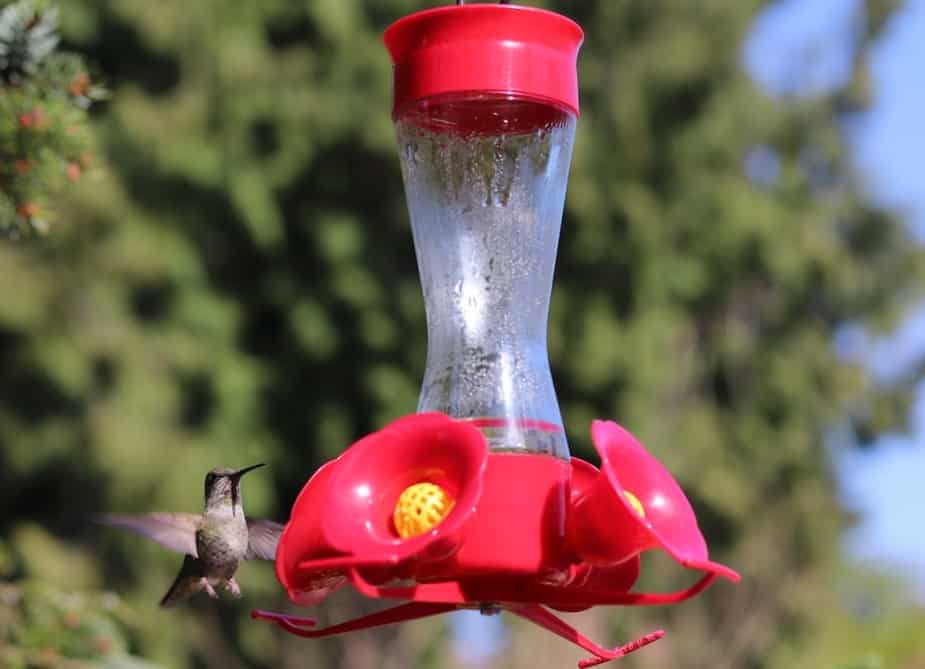
As mentioned before, your feeder can act like a “come and get it” bell, and all sorts of creatures will answer that call. Some of the methods used to keep bees away from hummingbird feeders will deter insects as well, but there are a few that are target-specific.
1. Use a Fishing Line to Hang the Feeder to Keep Ants Away
Ants can’t get a good grip on a
2. Insect Traps
Hanging a trap near the feeder redirects the insects away from the hummingbirds’ buffet. However, you should use these sparingly because the insects you trap are a vital part of the ecosystem, so you want to minimize those that you eliminate from your garden.
3. Put Up an Artificial Wasp Nest to Keep Wasps Away
Wasps are very territorial. The presence of a
2 Things You Shouldn’t Do to Keep Bees Out of Your Hummingbird Feeders
You can keep bees away from hummingbird feeders without killing them using the methods above.
Therefore, I highly advise against using the following methods to remedy your feeder situation. These can negatively affect the bees and your beekeeping hobby (or business).
1. Spray Insecticide on the Feeder
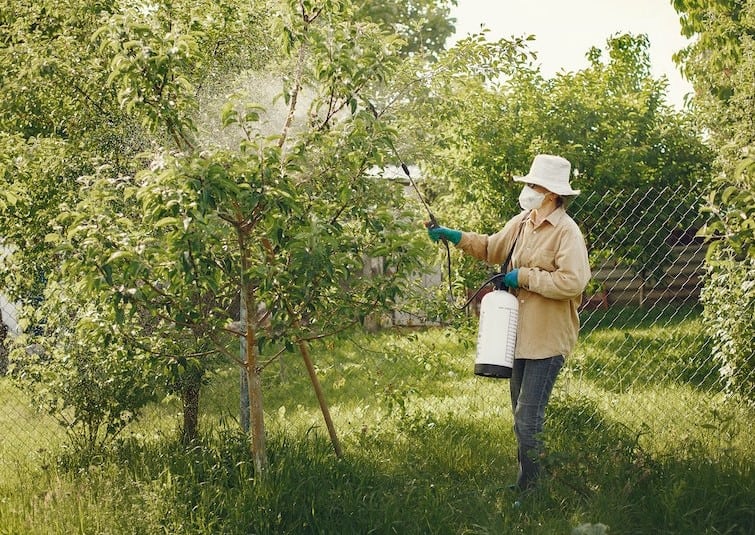
An insecticide is simply a dose of poison that kills insects. Using poison around the feeding port increases the chances that some of it will get to the nectar within, ultimately poisoning the very bird you’re going out of your way to help.
Furthermore, insects are important to the ecosystem, so, where possible, your aim is to do as little harm to the populations as possible.
2. Smear Oily Substances on the Feeder and Line
If you’ve watched a hummingbird dart from one flower to another, you know how quickly they go about their business.
It’s easy for the birds to brush up against objects as they go about their business.
Now, for a creature whose life depends on its ability to fly, oily feathers can be disastrous.
Once again, although this measure would work to keep some insects away, the potential to harm the bird is too high for it to be worth it.
Final Thoughts
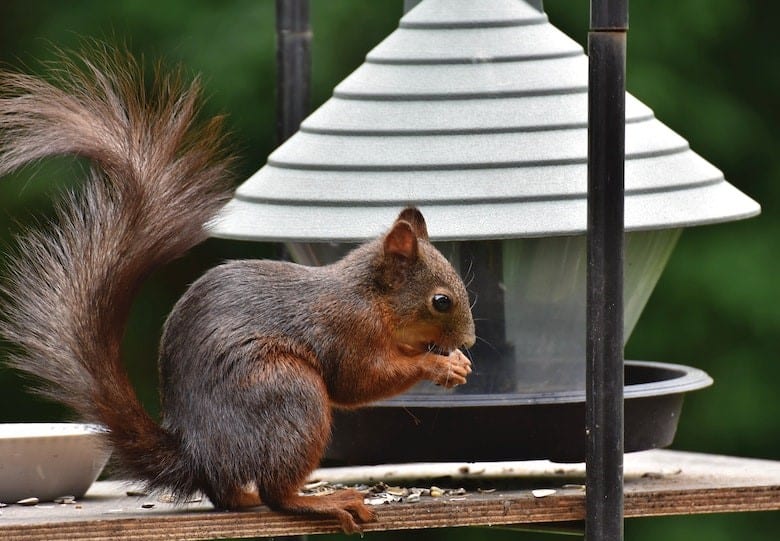
Although you will get lots of party crashers at your hummingbird feeders, you don’t need to destroy them to keep the guests of honor happy.
With a few tricks, you can ensure that your hummingbirds always have a nectar source and that other insects like bees and wasps are kept away with a clever rouse.
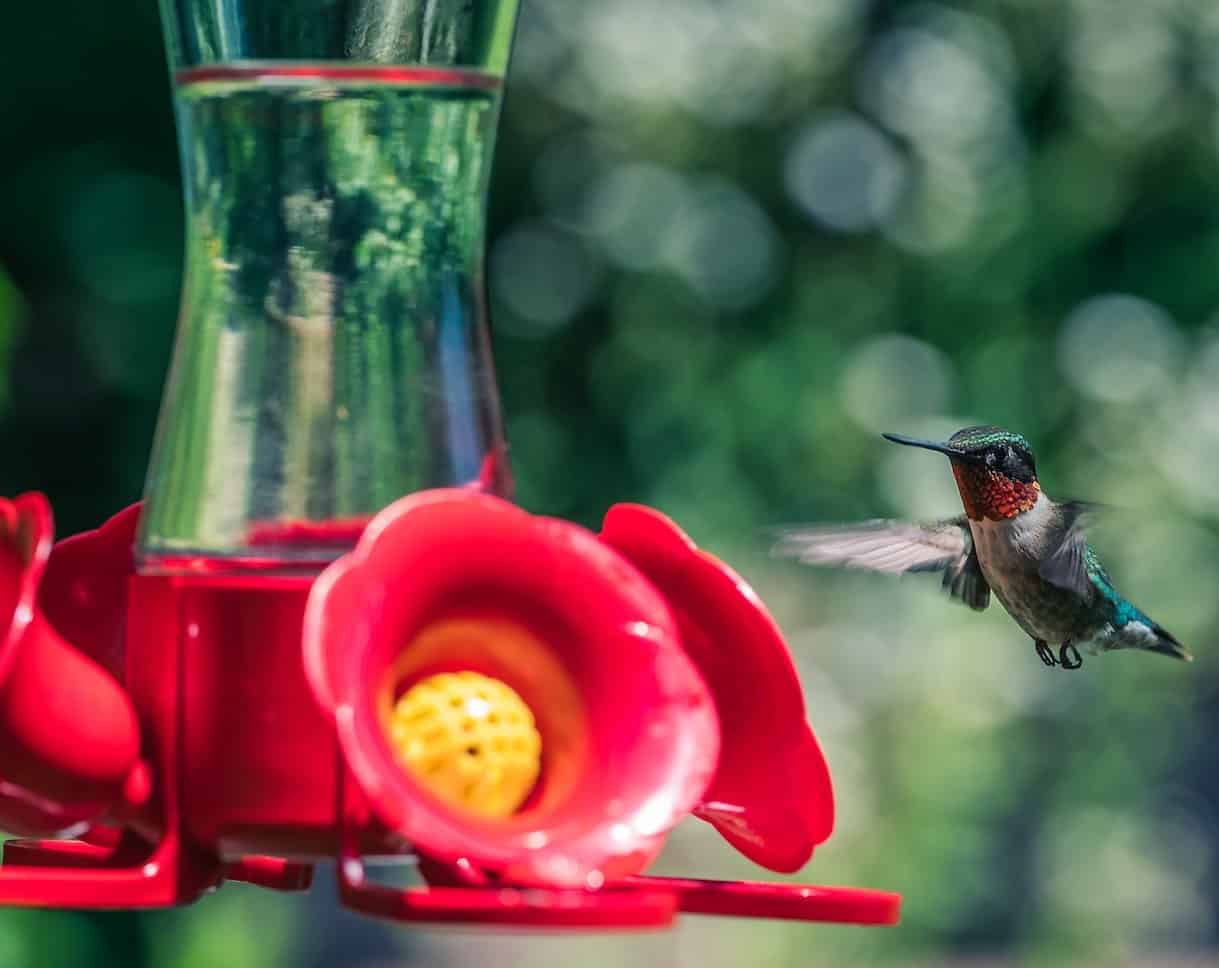
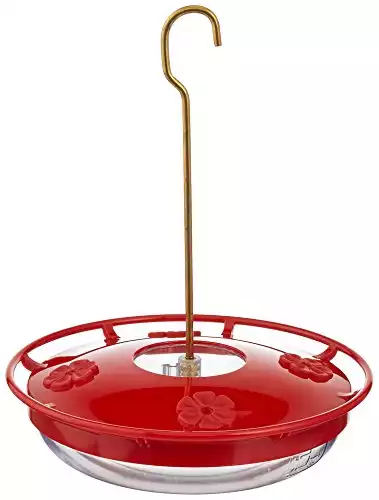
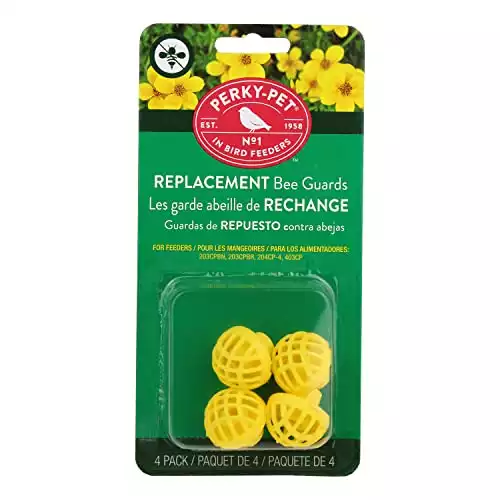
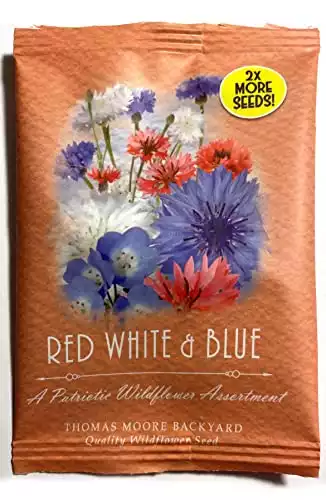
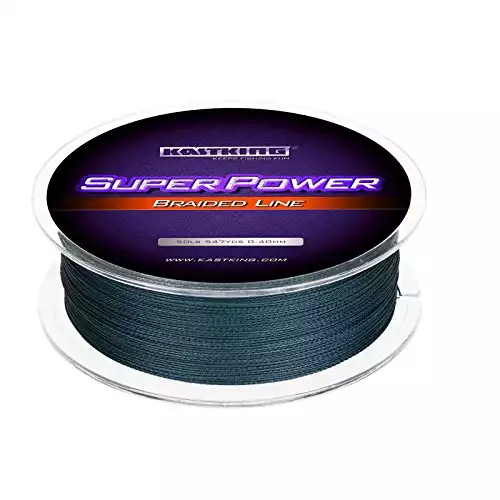
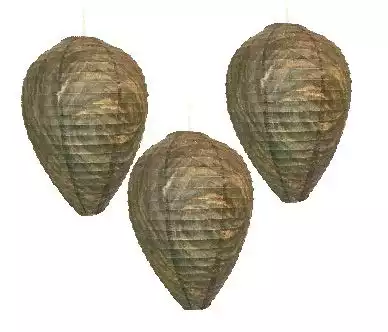
Interesting and good tips, which I will try pertaining to bees and wasps.
Loved this information. Searched for 15 min before locating this. I would like to inquire how to best clean hummers feeders. Have tried some vinegar and water mixture, and q tips. My feeders are plastic, the glass ones are to heavy for window hooks. Please e-mail me if want to contact me with information.
Clean feeders only with hot water. Do not use anything else (especially soap.) Make sure you change the water every two days. Your feeder will always be easy to clean, but if you leave it longer than two days, the hummers will die of liver disease. You do not have to put a lot of sugar water in the feeder one-two ounces is more than enough (unless you’re lucky enough to have lots of hummers.)
I have an established feeding area according to my husband. We go though about half a gallon a day of homemade 1:4 nectar. I clean my feeders w hot water every day and they get a good vinegar rinse (according to feeder directions) every week or 2 depending on how hot it’s been. It’s taken me about 7 years to build the hummingbird haven in my backyard. I started out with 2, maybe 3 visitors the first year and now I have families that return each year. I get so much joy out of the hummingbirds!
I clean my feeders by putting sand and water inside and shaking. It removes the black residue and is done outside and returned to the earth. No chemicals needed.
I have used pipecleaners instead of q-tips. I just use hot water to remove old residue — no cleaners (although perhaps there are some that are safe).
I soak my feeder in hot water and Dawn Detergent ’till the water is cool. Then I use a small soft brush and Q tips to fine tune the cleaning procedure. A cold water rinse until there are no suds finishes the job. Been doing this for years and have never found dead hummers laying around.
My ritual as well. Never found a dead bird and have had more show up in the spring and fall as they move for the seasons and lately I’ve had a lot more stay through the summer!
I recently had a major problem with bees taking over the HB feeder to the point where the HBs could not feed at all. After reading several articles on different websites, I removed the plastic yellow flower ports, and temporarily moved the feeder to a new location. I also rigged up a bee feeding station away from the HB feeder. The bees found it and love it. It has totally worked. I’m only getting a handful of bees at the HB feeder now, even after moving it back to the original place it was at when it got swarmed. My question is …How long do I keep feeding the bees to keep them away from the HB feeder? They drink a ton of sugar water. I’m worried that the bees will increase in numbers and turn my back yard into bee world. I like bees, but I don’t want to be overrun by them.
What kind of feeder did you make for the bees thanks
They are so many around my humming bird feeder
The most 100% effective way to keep bees off your hummingbird feeder is to get a Qtip, dip it in vegetable oil, spread the vegetable oil around the top of the feeder but not on the little hole where the hummingbird places its beak to eat. The bees will land on the feeder, not like the sticky oil on their feet, and just leave. This works 100% and does not not harm the hummingbirds. Please never kill bees.
I just read that oil will get on the hummingbird wings and slow them down. My hummingbirds always have captain that sits on the feeder and guards it from other hummers so they can’t eat from it! I tried all the suggestions on keeping the honey bees away to no avail. Last year I had hundreds of hummingbirds migrating but the jillion’s of bees have taken over
no nothing slippery, waxy or oily.
it can get on the hummingbirds and cause issues.
Isn’t there a chance the hummingbird wd get on their feathers and couldn’t fly
Regarding Bees at Feeder: I have found that spraying the top surface of the Hummer feeder with a mist of White Vinegar keeps the the Bees away and the Hummers do not seem to detect the vinegar and are not deterred from eating.
I used the suggestion to give the Bees their own higher sugar content food and so long as I periodically spray the hummer feeders they stick to their own feeder. They do go through a quart of food a day though.
My granddaughter worked at a horse stable and they used “SWAT” fly repellent ointment, to keep gnats and insects out of their ears and eyes. I bought some to use on my German shepherd’s ears, which get bad sores from these insects. It worked great. After trying many things to keep yellow jackets and hornets off the hummer feeders I thought about “Swat”. I use tube feeders. I rubbed some on the tubes and around the bottom near the feeding tube. but not on it so the hummers don’t get any on their beaks. It’s an instant fix. I’ve been using it for the last 2 summers and bees stay clear of the feeders. Swat is available on Amazon. Wash your hands well after using.
We have live on this 9 acres of woods for 30 years…have a hummer feeder in back and 1 in front….usually have ANT problems….have had no ants on feeders this summer …..but for the past 2 days, they both look like BEE hives…..I hosed them off… they come right back… I had the yellow bee screens in…made no difference….they were unable to get to the sugar water, but neither could the hummers….so I took them down and put up 2 with the single little flower and 1 tiny hole…… no difference..the whole bottom of the feeder was covered with Bees……my hubs was out trying to trim brush and they were all over him..,.everyone says bees are endangered… they can come to my house!!!! I have more than enough…I am just wondering if there may be a hive somewhere but no clue how to find it.,.!! …. we live in 9 acres of woods……!!
And in top of it all….
THE STINKBUGS ARE BACK ..!!!!!
thoroughly cleaned hb feeders, sprayed liberally with white vinegar and peppermint and within minutes the bees were all over the feeder and started swarming me like I’m the enemy! Most didn’t stay long but a few were persistant.